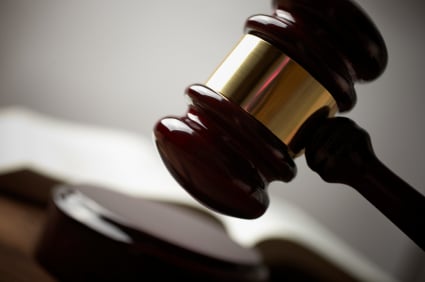
One type of legal plagiarism that is often covered in the news is copyright infringement, where an individual or business unlawfully infringes on another entity's intellectual property – essentially using the content without license or attribution. One example is the well-known case in 2009 of Apple winning a copyright infringement case against Psystar for illegally copying, modifying, and distributing Apple's code.
However, legal plagiarism frequently happens at the hands of lawyers. Lawyers intentionally or unintentionally plagiarize content and unlawfully utilize it within legal documents or in the courtroom. These types of cases can mean harsh repercussions for a lawyer (or the business they are representing).
One recent example involved an Iowa attorney named Peter Cannon. Cannon submitted a large amount of material to the court in the form of legal briefs. It was found that nearly all of this material was copied word for word from an article previously written by a law firm and published online.
The official court statement on the matter read:
“Seventeen of the nineteen total pages in the pre-hearing brief are verbatim excerpts from the Article. Mr. Cannon added some introductory material, a one-page section titled “Argument,” and a conclusion. In between the introduction and argument, most of the first twenty pages of the Article are reproduced verbatim.”
Cannon was claiming credit for work that was not his -- and he also was likely infringing on the intellectual property of the law firm.
Many of the materials used in the court of law would fall under ‘fair use,’ due to the fact-heavy nature of legal writing. In fair use cases, evidence and data are free to be repurposed in legal documents because they considered known facts and not covered under copyright. However, in Cannon’s case, copyright was likely breached due to his unattributed reuse of creative content that diverged from factual information.
Understandably, lawyers like most professionals find themselves short of time, which is one of the main reasons for plagiarism. However, lawyers are not exempt from the law and must obey the same code of ethics as everyone.
Technology like iThenticate offers lawyers and legal professionals a document-to-document analysis that compares documents that are submitted in court to both online and offline data repositories, and immediately highlights any similarities.
It's a lawyer's objective to protect their clients' reputations; it's just as important that lawyers protect their own as well. With the rise of plagiarism detection software usage in the legal industry, I foresee writing about legal plagiarism more frequently.
Citations
Greg, L Jennifer & Peterson, D James. “Copycat: Plagiarism, Copyright Infringement, & Lawyers.” Wisconsin Lawyer. June 2011. http://www.wisbar.org/AM/Template.cfm?Section=Wisconsin_Lawyer&template=/CM/ContentDisplay.cfm&contentid=102960
Trout, Brett. “Iowa Lawyer Sanctioned for Plagiarism.” BlawgIT. September 17th, 2007. http://blawgit.com/2007/09/17/iowa-lawyer-sanctioned-for-plagiarism/
Topics: Legal